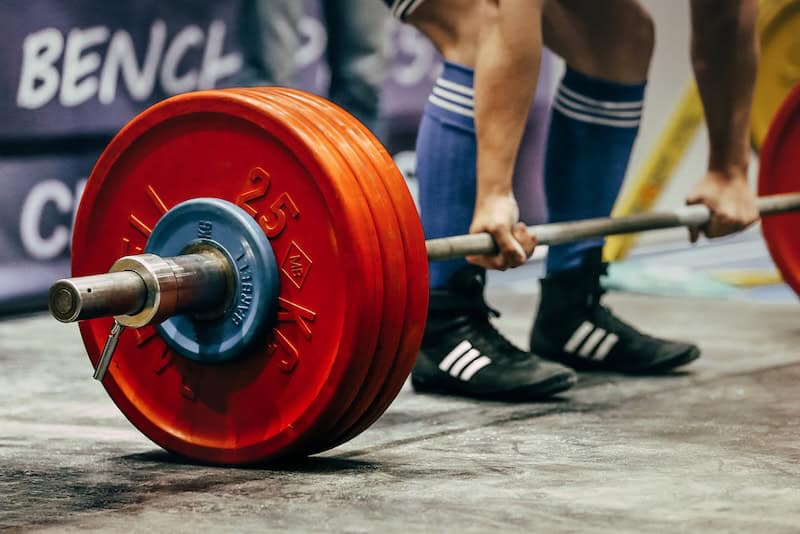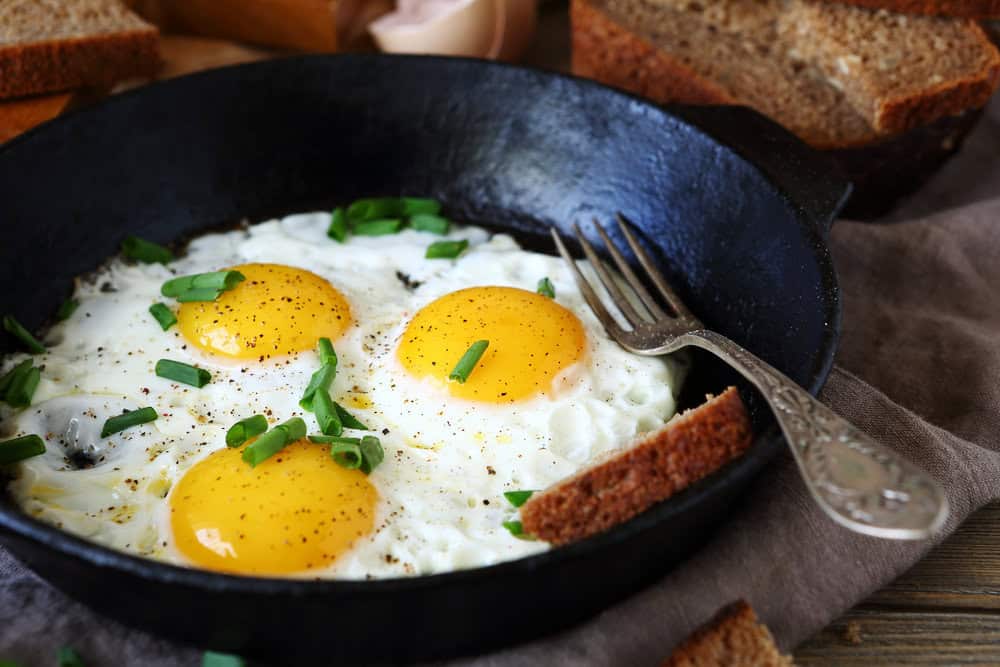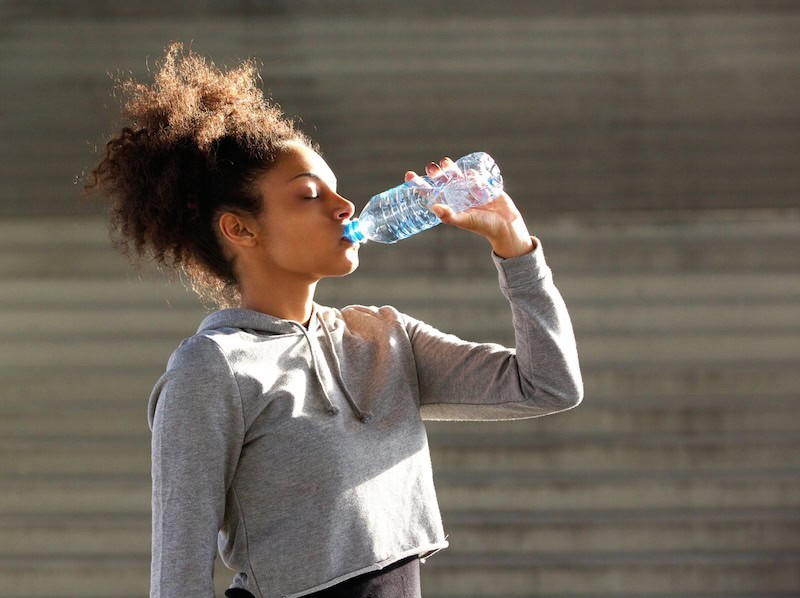If you are trying to improve your exercise performance, you may have heard about glutamine supplements. But what is glutamine and can glutamine help increase endurance levels during your workouts? Let’s find out.
Glutamine is an abundant amino acid found in your body as well as many protein foods. It is required for a variety of essential body functions but its main role is to act as a building block for proteins.
Glutamine can be found in two different forms: L-glutamine and D-glutamine. While they are mostly the same, they have slight differences in their molecular form. L-glutamine is the form you will find in foods and supplements which is typically just labeled as “glutamine” [1].
You can find glutamine in almost every protein food, such as beef, poultry, fish, eggs, and dairy products.
Because glutamine is made by your body, you typically don’t need it from food; however, in certain circumstances, it may become conditionally essential. This is when your glutamine needs become higher than normal, such as with injury or illness [2].
Glutamine also plays an important role in your immune and intestinal health by acting as an important fuel source for the cells of these different systems. Glutamine may also provide benefits in muscle gain, athletic performance, and post-exercise recovery [3, 4, 5].
- What is an Essential Amino Acid?

Amino acids are the building blocks for proteins. There are 20 different amino acids and they can be categorized into 3 different types: essential, non-essential, and conditionally essential.
Of the 20 amino acids, 9 are considered essential and they are histidine, isoleucine, leucine, lysine, methionine, phenylalanine, threonine, tryptophan, and valine [6].
As the name implies, these amino acids are considered essential because our body is unable to synthesize them on its own. Instead, we must obtain them from food sources. Our body can make the other 11 non-essential amino acids.
- What is a Conditionally Essential Amino Acid?
Some non-essential amino acids may be considered “conditionally essential” under certain circumstances with glutamine being one of those.
These circumstances are typically during an injury or illness where your body will require higher levels of these non-essential amino acids and your body is not able to produce enough to match the higher demands.
In addition to glutamine, arginine, cysteine, tyrosine, glycine, proline, and serine can become conditionally essential under these conditions [7].
- Do Athletes Deplete Glutamine During Intense Training?

Whether you are performing short bouts of intense exercise or prolonged intense exercise, you may be depleting your glutamine levels, especially if you are overtraining. This can occur over one day or many weeks [8].
Glutamine synthesis is slowed and depletion is increased during intense exercise because your body is sending more glutamine to your liver and immune cells [8].
Additionally, physical inactivity may reduce both glutamine synthesis and availability, according to studies. However, moderate-intensity training may improve glutamine availability [8].
Therefore, it depends on your level of training whether or not you may be depleting your glutamine levels or improving them but, typically intense exercise causes depletion and supplementation may be beneficial.
- What are the Best Dietary Sources of Glutamine?
Glutamine can be found in some amounts in all protein foods including meat, fish, poultry, eggs, and dairy products. However, eggs, beef, skim milk, and tofu are believed to contain higher sources of glutamine compared to other protein foods [9].
It can be difficult to determine the exact levels of glutamine in different foods and therefore it is recommended to increase your protein intake or choose a glutamine supplement if you are looking to add more glutamine to your diet.

- Should Athletes Supplement With Glutamine
There is promising research to support the potential benefits of glutamine supplementation for athletes, specifically on improvements in endurance, reducing fatigue, and improving post-exercise recovery.
However, many studies did not find any benefits in consuming glutamine supplements for these purposes therefore more research is needed to determine if glutamine really provides these benefits for athletes or not.
Additionally, most athletes consume a high-protein diet and are likely already getting higher levels of glutamine than the average person and supplementation may not be necessary [10].
- Can Glutamine Supplements Help Increase endurance?
Based on the studies available, glutamine supplementation has been shown in many cases to improve certain markers for fatigue; however, it was not necessarily associated with increased exercise performance.
While it may improve some fatigue parameters, glutamine appears to have a limited effect on endurance levels, and more studies are still needed.
However, taking glutamine supplements will not negatively impact performance and those who consume a lower protein diet may find benefits in taking this supplement including improvements in immune function and post-exercise muscle soreness [11, 12].
- When to Take Glutamine Supplements for Best Results?
Currently, there is no established recommendation for the best time to take glutamine supplements.
Because there is more research available on post-exercise recovery, it may be beneficial to take glutamine post-workout, particularly following intense exercise to replenish depleted glutamine levels [5, 13].
References
- Protein design with L- and D-alpha-amino acid structures as the alphabet by Susheel Durani – 2008, Oct;41(10):1301-8. doi: 10.1021/ar700265t. Epub 2008 Jul 22.
- Amino acids – Binder HJ, Mansbach CM. Nutrient digestion and absorption. In: Boron WF, Boulpaep EL, eds. Medical Physiology. 3rd ed. Philadelphia, PA: Elsevier; 2017:chap 45. Updated by: Stefania Manetti, RD/N, CDCES, RYT200, My Vita Sana LLC – Nourish and heal through food, San Jose, CA. Review provided by VeriMed Healthcare Network. Also reviewed by David C. Dugdale, MD, Medical Director, Brenda Conaway, Editorial Director, and the A.D.A.M. Editorial team.
- Glutamine as an immunonutrient – Hyeyoung Kim – Yonsei Med J – 2011 Nov;52(6):892-7. doi: 10.3349/ymj.2011.52.6.892.
- Effect of glutamine supplementation combined with resistance training in young adults – D G Candow, P D Chilibeck, D G Burke, K S Davison, T Smith-Palmer – 2001 Dec;86(2):142-9. doi: 10.1007/s00421-001-0523-y.
- The Influence of Oral L-Glutamine Supplementation on Muscle Strength Recovery and Soreness Following Unilateral Knee Extension Eccentric Exercise – Zachary Legault, Nicholas Bagnall, Derek S Kimmerly – 2015 Oct;25(5):417-26. doi: 10.1123/ijsnem.2014-0209. Epub 2015 Mar 26.
- Protein and Amino Acids – ncbi –National Research Council (US) Subcommittee on the Tenth Edition of the Recommended Dietary Allowances. Washington (DC): National Academies Press (US); 1989.
- Biochemistry, Essential Amino Acids – Michael J. Lopez; Shamim S. Mohiuddin. Affiliations: Augusta Un., Medical College of Georgia, Imam Abdulrahman Bin Faisal University, Dammam. Last Update: April 30, 2024.
- Effect of physical activity on glutamine metabolism – Francesco Agostini, Gianni Biolo – 2010 Jan;13(1):58-64. doi: 10.1097/MCO.0b013e328332f946.
- Evaluation of a novel food composition database that includes glutamine and other amino acids derived from gene sequencing data – C M Lenders 1, S Liu, D W Wilmore, L Sampson, L W Dougherty, D Spiegelman, W C Willett – 2009 Dec;63(12):1433-9. doi: 10.1038/ejcn.2009.110. Epub 2009 Sep 16.
- Dosing and efficacy of glutamine supplementation in human exercise and sport training – Michael Gleeson – 2008 Oct;138(10):2045S-2049S. doi: 10.1093/jn/138.10.2045S.
- Glutamine as an Anti-Fatigue Amino Acid in Sports Nutrition – Audrey Yule Coqueiro,1,* Marcelo Macedo Rogero,2,3 and Julio Tirapegui1 – 2019 Apr; 11(4): 863. Published online 2019 Apr 17. doi: 10.3390/nu11040863
- Glutamine and the effects of exhaustive exercise upon the immune response – L M Castell 1, E A Newsholme – 1998 May;76(5):524-32. doi: 10.1139/cjpp-76-5-524.
- Effect of Glutamine Supplementation on Muscular Damage Biomarkers in Professional Basketball Players – Alfredo Córdova-Martínez,1,* Alberto Caballero-García,2 Hugo J Bello,3 Daniel Pérez-Valdecantos,1 and Enrique Roche4,5,6 – 2021 Jun; 13(6): 2073. Published online 2021 Jun 17. doi: 10.3390/nu13062073.









